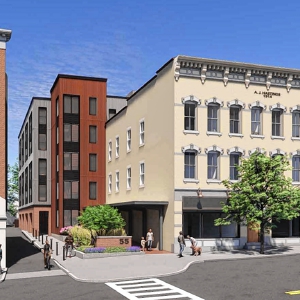UMass prof’s study of erosion leads to top award
| Published: 07-09-2017 11:43 PM |
AMHERST — A University of Massachusetts Amherst geosciences assistant professor has won one of the field’s most prestigious awards for those early in their career.
The American Geophysical Union’s Earth and Planetary Surface Processes Focus Group announced in late June that Isaac Larsen had won the Luna B. Leopold Young Scientist Award for 2017.
“I was surprised and felt honored,” Larsen said Friday.
Others, however, may have been less surprised.
“This is the top early career award in geomorphology in the country and the most competitive,” Julie Brigham-Grette, chairwoman of geosciences, said in a statement. “Isaac’s influence on the geosciences is skyrocketing.”
Larsen won the award because of his widely recognized work, which includes research on how forest fires affect soil erosion, the role that Ice Age megafloods played in eroding landscapes and the role of agriculture on erosion and the implications for soil productivity.
“My research sort of spans going back in geological time up to the present,” Larsen said.
That research is essential for understanding the current era, which geologists have proposed calling the Anthropocene epoch because of humans’ significant impact on the planet, whether through pollution, climate change, intensive agriculture or other influences.
Article continues after...
Yesterday's Most Read Articles
 ‘Our hearts were shattered’: Moved by their work in Mexico soup kitchen, Northampton couple takes action
‘Our hearts were shattered’: Moved by their work in Mexico soup kitchen, Northampton couple takes action
 Springfield man charged with murder in Holyoke stabbing
Springfield man charged with murder in Holyoke stabbing
 Amherst-Pelham schools look to address school absences with new plan
Amherst-Pelham schools look to address school absences with new plan
 Two men dump milk, orange juice over themselves at Amherst convenience store
Two men dump milk, orange juice over themselves at Amherst convenience store
 Next 5-story building cleared to rise in downtown Amherst
Next 5-story building cleared to rise in downtown Amherst
 Three Amherst Regional Middle School counselors absolved of Title IX offenses
Three Amherst Regional Middle School counselors absolved of Title IX offenses
“Geologists are essentially studying our home planet, Earth, how it functions, its history,” Larsen said. That understanding, he said, is “critically important for our understanding how Earth will change going forward.”
Given his knowledge of erosion, Larsen said that if agricultural practices continue as usual, his outlook on the fate of the planet is pessimistic.
“We are certainly eroding soil faster than it is forming, but on the other hand, there are agricultural techniques and different ways of farming that are much less detrimental to the soil, and it’s possible to actually rebuild soil over relatively short time scales,” he said. “We have a path forward — it’s just a matter of getting it to be adopted.”
Geology, Larsen said, will play a large part in making sure that path forward is clear.
“My view is that policies should be based on the best data that are available, and for a lot of issues where geology and society intersect, we don’t have a lot of information, he said. “So what I’m trying to do is to gather that information and put it out in the public arena.”
Dusty Christensen can be reached at dchristensen@gazettenet.com.

 Boyfriend accused in slaying of Hampden sheriff’s assistant, former legislator’s top aide
Boyfriend accused in slaying of Hampden sheriff’s assistant, former legislator’s top aide Crocker School kids draw on historical picture books for library banner project
Crocker School kids draw on historical picture books for library banner project Organizers ramping up for bigger Northampton Pride this year
Organizers ramping up for bigger Northampton Pride this year Revised plan to combat bullying in Amherst regional schools questioned
Revised plan to combat bullying in Amherst regional schools questioned
